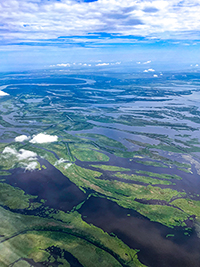When the School of Science and Engineering reconsidered a civil engineering curriculum, they brought it back with a 2023 update: Civil Engineering – Water Resources and Environmental, a minor for undergraduate students.
Now the school has laid some of the groundwork for what will surely be an in-demand specialty of the engineering field, in New Orleans and beyond.
“There is a real desire to bring this type of engineering back to Tulane,” said Mead Allison, PhD, chair of the River-Coastal Science and Engineering department, which is housed in Tulane’s School of Science and Engineering. “When I told the School of Science and Engineering board that we were going to roll out a minor that has ‘civil engineering’ in the name, there were cheers.”
The new minor will join other nationally recognized programs and centers at Tulane that are focused on water and coastal issues. These include The ByWater Institute, a leading environmental research institute that uses the Mississippi River as its laboratory. In 2021, Tulane was also chosen as a member of the Gulf Scholars Program, part of the National Academies’ Gulf Research Program, which funds studies and projects on the future of the Gulf of Mexico. These initiatives and more, including Tulane’s location in New Orleans, position it as a highly sought-after spot for river and coastal research, an essential component of addressing climate change-related issues. Settled between Lake Pontchartrain and the Mississippi River, and near the Gulf of Mexico, researchers at Tulane have ample opportunity to study water engineering, and students can get hands-on experience.
This minor is the latest development by the department to increase its offerings to undergraduates. “It’s a great stepping stone, as the faculty continues to grow, to rolling out a similar major,” Allison said.
For prospective graduate students, Tulane also now offers a PhD program and resident and non-resident Master of Science programs in River-Coastal Science and Engineering. The non-resident program will allow professionals to get a top-rated advanced degree from Tulane while continuing their careers.
“The non-resident master’s will not be any different from the resident master’s in terms of coursework or requirements,” said Allison. “It’s just that it is designed to serve folks where it is not possible to be physically in New Orleans due to their job.”
This non-resident master’s program is one of the first of its type at the School of Science and Engineering. It is a continuation of the non-residential option that has been available for the graduate certificate in River Science and Engineering since 2017; Allison is excited about the opportunities it will provide for professionals working in fields pertaining to water sciences and engineering.
“It makes a lot of sense for this to be happening because the faculty is super knowledgeable,” said William Coronel, a PhD student in the new graduate program. “I think there’s a lot to gain from these bright minds that make up the department.”
































































